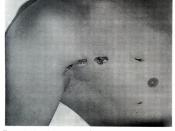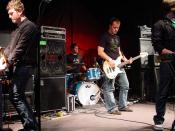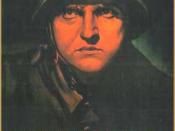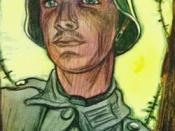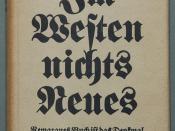Candles in the Wind There are books written that have a message that is so powerful people remember them. After reading a book like All Quiet on the Western Front, one is able to relate what happened to the characters to his or her own life and they look at situations differently. This is a novel that has a lasting effect on those who read it. It is compassionate, very strongly written, and contains intense emotions from young men serving for their country.
In the novel, a main theme is that war causes suffering. The three different types of suffering detected are emotional, physical, and social suffering. There are many different examples of all three types of suffering scattered throughout the novel and they are examined below.
Emotional suffering is directly connected to the men's mental state of mind. The reason for this is that if a man is healthy mentally they will not experience abnormal emotions.
But, if a man isn't mentally healthy then they may experience bizarre emotions and stop using reason and common sense. At one point Paul Baumer, the narrator of the novel, says, "We have become wild beasts"æwe defend ourselves against annihilation"æno longer do we lie helpless, waiting on the scaffold, we can destroy and kill, to save ourselves and to be revenged."� This quote shows that they no longer use reason. In the novel it goes on to say that if they stopped to think about ducking or running at a different angle then it would be too late and they would have already been shot. They rely on instinct and chances, but not even a soldier outlives a thousand chances. Every soldier believes in chance and trusts his luck. They have no hope; they fear and love without it. These men have been forced to act like adults before they are ready. Baumer describes them as; "Forlorn like children, and experienced like old men"æI believe we are lost."� A schoolmaster, Kantorek, highly encouraged his whole class to sign up, and other elders would label all men who failed to sign up cowards. So at first the boys were eager to join the army, but that was one of the first things that the trainers eliminated in them. The future is now unclear for the soldiers and when they have time they ponder what will happen if any of them ever live to peacetime. They were in school, and now they are too old for it. Many of them didn't have jobs or wives. "I am young,"� says a soldier, "I am twenty years old; and yet I know nothing of life but despair, fear, and fatuous superficiality cast over an abyss of sorrow."� What would a war novel be without blood, guts, and gore? Well, not a very accurate war novel is what it would be. It's obvious that this theme of death and physical suffering plays a major role in All Quiet on the Western Front. In chapter two one of Baumer's close friends Kemmerich dies, probably from an infection that set up in his what was left of his leg after it was amputated. As side from deaths, the injuries are described in great detail"æ "Two fellows die from tetanus. Their skin turns pale, their limbs stiffen, at last only their eyes live-stubbornly"æmany of the wounded have their shattered limbs hanging free in the air from a gallows; underneath the wound a basin is placed into which pus drips. Every two or three hours the vessel is emptied"æyou have to realize that beneath the face in pain there is still life and this is only one hospital, one single station; there are hundreds of thousands in Germany, hundreds of thousands in France, hundreds of thousands in Russia."� When Baumer and Albert Kropp are wounded and they go to the hospital there is a single death room, but as they are there the men begin to die quicker and there isn't even enough time to wheel them out of the room. Men come and go at a rapid pace. Also cloth bandages become rare and paper is used instead. There are so many injured and dying that the nuns can not keep up. On each floor of the hospital there are different areas for different wounds. Abdominal and spinal, head wounds and double amputations, jaw wounds, wounds in the joints, wounds in the kidneys, wounds in the testicles, wounds in the intestines. Baumer is amazed at all the different places one can be shot or stabbed.
Along with emotional and physical suffering there is social suffering. The country loses a whole generation of men. Wives and children are without husbands and fathers. There isn't anyone to take over the farming meaning there will not be enough food for the growing generation. The fields will be left un-ploughed and the ground will become unfertile. There won't be a generation of doctors. The sickly will overwhelm those in the practice and there won't be teachers. War creates a break in the circle of life that will take years to be repaired. When a pattern is disrupted people have to work harder than usual to get it going again.
The men were candles in the wind. They were on the battlefield expected to fight against men when they weren't fed enough, their clothes and bodies were dirty, and they didn't have a warm building to reside in. They had to get up as soon as the shells began falling; there weren't any designated sleeping hours. And the soldiers were aware that they might snap at any moment, they had seen other do so right in front of them. Baumer reflects on this by saying, "We are little flames poorly sheltered by frail walls against the storm of dissolution and madness, in which we flicker and sometimes almost go out."�

